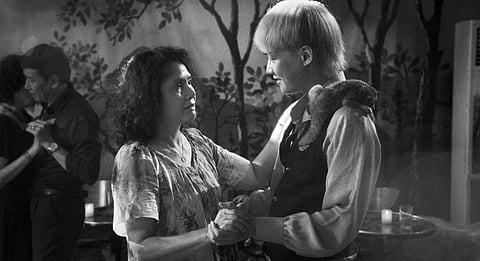

Pham Ngoc Lan’s Cu Li Never Cries begins on a pensive note with Mrs Nguyen (Minh Chau) marking an apprehensive and anxious return home to Vietnam in the middle of the night. Her troubled thoughts echo in the background as the camera follows her down the winding lanes to her working-class home. She is beset by the feeling of unfamiliarity and confesses having become a stranger in the very place that she belongs to. Home doesn’t seem like home; the familiar has become foreign. It’s a lyrical introspection on alienation.
She had been away in Germany to collect the ashes of her dead ex-husband. Along with the cremation urn, she is also carrying an inheritance from the deceased—Cu Li, a primate from the Vietnamese rainforest, a Pygmy slow loris, that had been his pet. On her return, she finds it tough to reconnect with her young niece Van (Ha Phuong) who is preparing to marry her long-time beau Quang (Xuan An).
Van’s pregnancy has forced the couple to hasten their proposal ceremony, despite uncertainty looming large in their future together. Her auntie, on the other hand, revisits the past in her journey to immerse her estranged husband’s ashes at the very place where she had first met him.
Cu Li Never Cries is a classic slice-of-life cinema. Rather it's a slice of relationship cinema, all about how individuals are shaped and influenced by those around them just as they impact others.
The thematic core draws from the evocative, observational cinematography of Vu Hoang Trieu, Nguyen Vinh Phuc and Nguyen Phan Linh Dan and the musical score by Tran Kim Ngọc. The camera often boxes humans within architectural grids, like the small suffocating rooms they live in. As opposed to that, they also get framed against the landscape, like tiny dots in the vast expanse of nature, metaphors for being ambushed by the larger scheme of things.
There’s a stillness to the shots, time passes by slowly and the camera often goes static. However, the unhurried narrative and the calm harbours an underlying turbulence and tumult. A palpable tension runs in Mrs Nguyen and Van’s relationship with each other. She brought her up like a daughter when her parents passed away. Why should she go away with Quang and his family to the village, leaving the auntie all alone in Hanoi? On the other hand, Mrs Nguyen is quite devilishly class and stature-conscious, putting her own city and family way up on the social ladder as opposed to Quang’s rural relatives. What should ideally have been simple, intimate ties, appear to have acquired layers of underlying complexities.
The impending marriage with Quang doesn’t look like a categorical answer to the couple’s quest for happiness. Mrs Nguyen, on the other hand, has the companionship of Cu Li and its huge, watchful eyes to fall back on. There’s a new friendship with a pet shop owner and a young waiter. But will that fill up her inner emptiness and sense of restlessness? after having been through the war, its aftermath and the displacement abroad as part of the labour force.
Cu Li Never Cries is meditative, contemplative cinema about the longing for stability within the family, society and the country. The title is suggestive of the resilience, continuity and endurance in the face of the many changes through the passage of time.